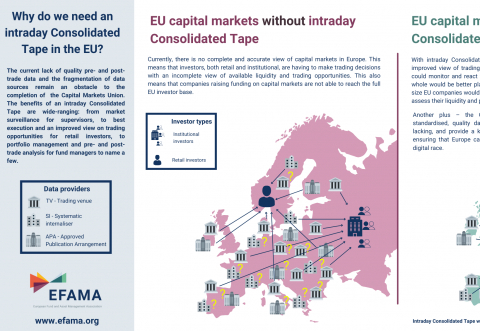Capital Markets Union
Building a Capital Markets Union (CMU) serving the needs of European citizens and businesses is as ambitious as it is essential: the effort will enable pensioners and savers to share in the upside of Europe’s economic recovery. In the process, European capital markets also become more efficient and better integrated. This long-term vision is key to financing European innovation and to supporting the transition towards a more sustainable economy.
Increasing retail investors’ participation in capital markets is an essential component for building an effective CMU. Improving access to financial and non-financial information and addressing the high data costs our industry is encountering, are also important steps towards a functioning CMU. All this, while maintaining and improving the attractiveness of the European investment management sector in today's global environment.
EFAMA prepared a list of key actions that are required to reach the CMU objectives from an investor perspective. We have also developed a specific Key Performance Indicator to measure year-on-year progress towards increasing retail participation in capital markets in each member state.
EFAMA on EC Proposal on low-carbon benchmarks and positive carbon impact benchmarks
EFAMA position paper on EC proposal on facilitating cross-border distribution of collective investment funds
EFAMA’s response to the European Commission’s public consultation on fitness check on Supervisory reporting
Asset managers support Letta report emphasis on furthering the single market and mobilising private capital
Former Italian prime minister Enrico Letta has released today his report on the future of the Single Market. Together with the recent statement of the Eurogroup in inclusive format on the future of CMU, and the upcoming report of Mario Draghi, there is increasing emphasis on EU competitiveness and the need to make urgent progress towards achieving a well-functioning Capital Markets Union to finance Europe’s necessary transitions.
EU policymakers need to focus on competitiveness and completing the Capital Markets Union in order to fund the triple transitions
EFAMA has released its policy recommendations to unlock private investment in Europe
Unlocking private investment to fund Europe's triple transitions
EFAMA’s publication lays out the asset management sector’s policy priorities for the next five years, building on the in-depth expertise of our members. This includes practical recommendations for keeping Europe competitive and developing deeper, more integrated and liquid capital markets in Europe.
The recommendations focus around four main objectives:
Household Participation in Capital Markets
This report analyses the progress made in recent years by European households in allocating more of their financial wealth to capital market instruments (pension plans, life insurance, investment funds, debt securities and listed shares) and less in cash and bank deposits. It also includes policy recommendations on improving retail participation in capital markets, including for the Retail Investment Strategy currently under discussion.
Some key findings include:
Visual | Why do we need a real-time Consolidated Tape in the EU?
The current lack of quality pre- and post-trade data and the fragmentation of data sources remain an obstacle to the completion of the Capital Markets Union. The benefits of a real-time Consolidated Tape are wide-ranging: from market surveillance for supervisors, to best execution and an improved view on trading opportunities for retail investors, to portfolio management and pre- and post-trade analysis for fund managers to name a few.
Market Insights | Issue #5 | Perspective on the net performance of UCITS
Equity UCITS delivered a total net return of 108% in real terms in 2010-2019, whereas bank deposits lost 10% in net value































